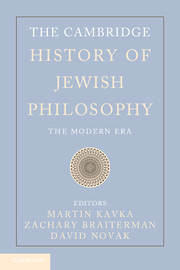Book contents
- Frontmatter
- Contents
- Contributors
- Acknowledgement
- Introduction
- I Judaism's Encounter with Modernity
- II Retrieving Tradition
- III Modern Jewish Philosophical Theology
- IV Jewish Peoplehood
- 16 Reflections on the Challenges Confronting the Philosophy of Halakhah
- 17 Liturgy
- 18 Jews Alongside Non-Jews
- 19 Political Theory: Beyond Sovereignty?
- 20 Zionism
- V Issues in Modern Jewish Philosophy
- Bibliography
- Index
17 - Liturgy
from IV - Jewish Peoplehood
Published online by Cambridge University Press: 28 September 2012
- Frontmatter
- Contents
- Contributors
- Acknowledgement
- Introduction
- I Judaism's Encounter with Modernity
- II Retrieving Tradition
- III Modern Jewish Philosophical Theology
- IV Jewish Peoplehood
- 16 Reflections on the Challenges Confronting the Philosophy of Halakhah
- 17 Liturgy
- 18 Jews Alongside Non-Jews
- 19 Political Theory: Beyond Sovereignty?
- 20 Zionism
- V Issues in Modern Jewish Philosophy
- Bibliography
- Index
Summary
The subject of liturgy or synagogue ritual has been an abiding concern of modern Jewish philosophers. Moses Mendelssohn suggests that liturgy offers Judaism a special nonidolatrous form of representing God. Hermann Cohen argues that liturgy provides the “language of reason” of the Jewish congregation, and Franz Rosenzweig proposes that liturgy provides a special “Organonstellung” or “system of reasoning” for Jewish thought. Although the first modern Jewish philosopher, Spinoza, regarded Jewish liturgy as anachronistic and unnecessary in his vision of the new modern political order, the central German representatives of Jewish philosophy and American thinkers such as Abraham Joshua Heschel, Arnold Eisen, and a significant number of feminist thinkers celebrate liturgy as central to Jewish religious expression and helpful in meeting the challenge of accommodating Jews and Judaism to the modern political order. Since the new political and social orders of modernity required Jews to curtail the scope of much of Jewish law to accept the authority of state law, synagogue liturgy was one area where halakhah could still have free reign. In emphasizing the philosophical, ethical, and theological power of synagogue liturgy, modern Jewish philosophers provided justification for the modern transformation of Judaism into a “church” or religious community on the model of the Christian churches. Jews could remain Jewish in their synagogues and homes and be Germans, Frenchmen, Englishmen, or Americans in their public and professional lives.
- Type
- Chapter
- Information
- The Cambridge History of Jewish PhilosophyThe Modern Era, pp. 519 - 537Publisher: Cambridge University PressPrint publication year: 2012
- 1
- Cited by



